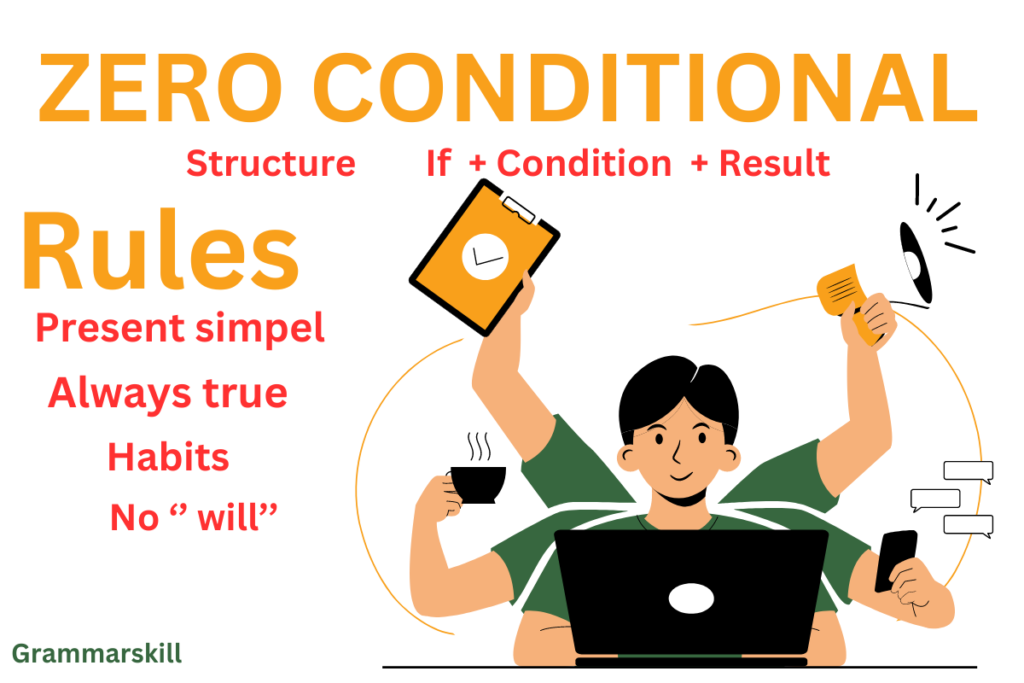Zero Conditional Explained with Simple Rules, Examples, and Uses, we’ll understand this essential component of English grammar and provide you with straightforward rules that even beginners can grasp. You’ll discover practical examples that illustrate its uses in everyday conversation while honing your grammar skill along the way. Get ready to unlock the secrets of conditional statements and learn how they can enrich both your writing and speaking abilities!
What is the Zero Conditional?
Every cause has its effect neatly tied together, like clockwork gears turning in perfect harmony. This is the essence of the zero conditional—a grammatical structure that brings clarity and precision to our expressions of reality. The zero conditional allows us to express situations that are universally true, creating a bridge between language and logic.
Definition of Zero Conditional
Our daily conversations, we often make statements that reflect this cause-and-effect relationship without even realizing it. For instance, when we say, If you heat water to 100 degrees Celsius, it boils, we’re not just sharing knowledge; we’re using zero conditional constructs to relay information that holds true universally.
Structure of Zero Conditionals

If + Present Simple, Present Simple
- If-clause: This part contains the condition, using the present simple tense.
- Main clause: This part shows the result in the present simple tense.
Rules for Using Zero Conditionals
General Truths and Universal Facts:
Use the Zero Conditionals to state facts that are always true.
- Use the Zero Conditionals to state facts that are always true.
- Plants die if they don’t get enough water.
Routine Actions and Habits:
It can describe habitual actions or routines that happen under specific conditions.
- If i wake up early in the morning, I get ready for school.
- If my parents give me pocket money ,I save it.
Instructions and Directions:
Often used in giving instructions or explaining processes.
- If you plug the switch the washing machine will start.
- If you will add cotton in the pillow it will become fluffy.
- What will happen if we plug the switch?
- What will happen if we don’t water the plants?
Examples Sentences of Zero Conditional
| If-Clause (Condition) | Main Clause (Result) |
| When you smoke’ | Your lungs get affected. |
| If you don’t water plants’ | They die. |
| If you don’t exercise’ | You gain weight. |
| When babies get hungry’ | They cry. |
| When it rains’ | The lawn gets wet. |
| If you are focused’ | You will achieve your goal. |
| If you take some medicines’ | You will feel better. |
| If you go out now, | You will get wet in the rain. |
| If you like animated movies, | You will like inside out. |
| If you plug the switch, | The machine will start. |
| If you will not cut your nail, | They will get dirty. |
Differences Between Zero Conditionals and Other Conditionals
To the English conditionals, particularly the zero conditional, which encapsulates this idea with striking clarity. While other conditionals dance in shades of possibility and speculation, the zero conditional stands firm, delivering universal truths that resonate like well-established laws of nature. Understanding these differences not only sharpens your grammar skills but also enriches your communication.
For example:
- Zero Conditionals: If you mix red and white you get pink.(Always true)
- First Conditional: If it will be sunny we will cancel the party.(Possible future event)
What is zero conditional with an example?
The zero conditional is a type of conditional sentence that describes general truths or facts—things that are always true when the condition is met.
Why is it called zero conditional?
The term zero conditional refers to a specific type of conditional sentence used in English grammar. It’s called zero because it describes situations that are always true or universally applicable, much like a scientific fact.
How to make a zero conditional?
Creating a zero conditional sentence is pretty straightforward! The zero conditional is used to talk about general truths or facts that are always true when certain conditions are met.
Conclusion
The zero conditional serves as a powerful grammatical tool for expressing universal truths and scientific facts that are always true. Its straightforward structure allows for clear communication of cause-and-effect relationships, making it an essential component of both spoken and written English. By mastering this conditional form, learners can enhance their ability to convey information accurately and confidently. Whether discussing natural phenomena or general rules, the zero conditional provides a solid foundation for effective expression.
Combination with Modal Verbs:
- Model verbs like ”can” and ”could” are occasionally employed to describe possibilities or suggestions ,even though zero conditional usually.
- Example:” If you will not study hard you will not succeed”. This suggests a potential outcome based on a factual condition.
To master the Zero Conditional, practice is key. Here are some tips:
Create Routine Sentences: Describe your daily habits using the Zero Conditional structure
Identify General Truths: Think of common facts or truths and try to form Zero Conditional sentences.
